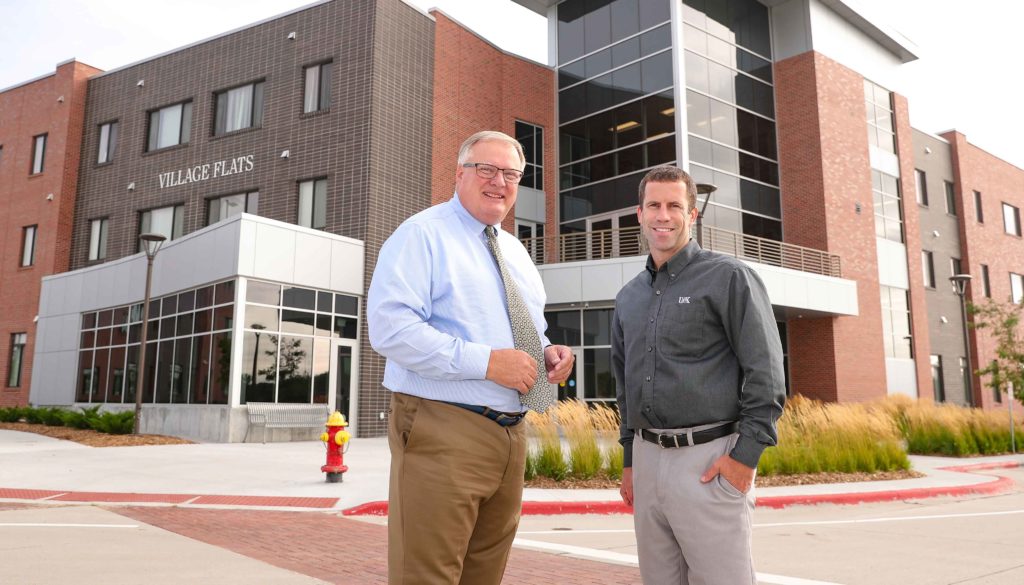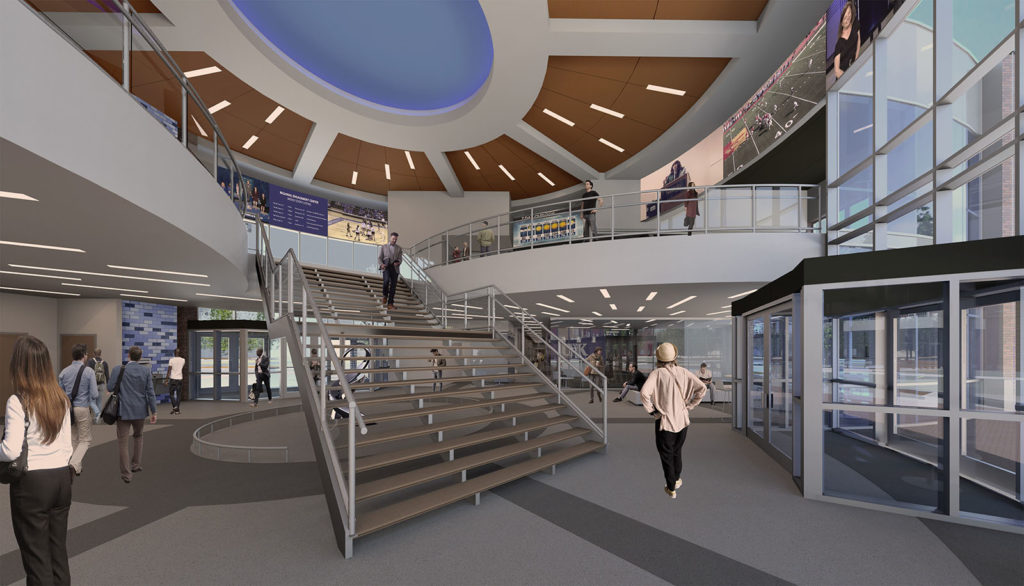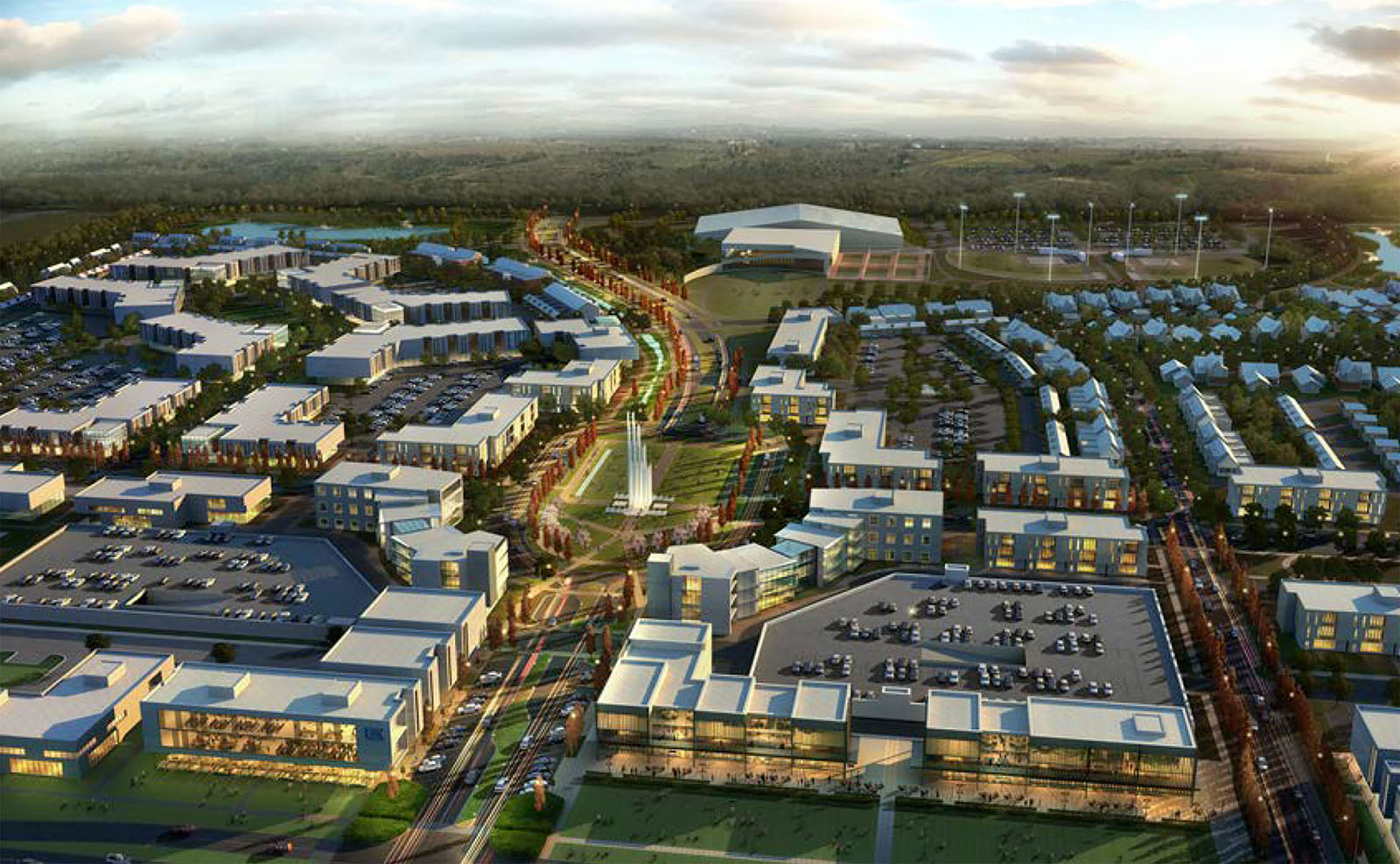
By TYLER ELLYSON
UNK Communications
KEARNEY – It’s easy to see the momentum at the University of Nebraska at Kearney’s University Village development.
Village Flats, a 99-unit, apartment-style housing complex completed in summer 2018, now stands on the former farm ground just south of UNK’s main campus and the $7.8 million, 19,900-square-foot LaVonne Kopecky Plambeck Early Childhood Education Center is scheduled to open there this fall.

Those buildings are just the beginning of a multiyear project that will transform 104 acres of UNK-owned land into an urban village in the heart of rural Nebraska.
“If you look at what we’ve been able to accomplish in the last five years under Chancellor Doug Kristensen’s leadership, it’s truly incredible for central Nebraska,” said Jon Watts, vice chancellor for business and finance at UNK. “In another five years, people will really be blown away by the progress and the vision will be apparent.”
Kristensen views the property along U.S. Highway 30 as a win-win-win for UNK, the city of Kearney and rural Nebraska. The development, planned as a mixed-use area with educational, residential, recreational, commercial and community engagement spaces located within a pedestrian-oriented neighborhood, will bring talented students and faculty to UNK and attract new businesses to the city while benefiting employers across the region, according to Kristensen, who called Kearney a “portal” to greater Nebraska.
“If you want to be successful in rural Nebraska, you need to come through Kearney,” Kristensen said.
The next building planned for University Village will give more businesses and organizations that opportunity.
A regional engagement center to be built just south of Village Flats will be the focal point of the entire property, according to Kristensen.
“I think it’s the linchpin of future development,” he said.
The center, currently proposed as a roughly 45,000- to 50,000-square-foot facility with two levels, multiple wings, a large atrium, state-of-the-art public hearing room and breakout rooms for meetings, will serve multiple purposes.
There will be offices for businesses and nonprofits, as well as technology-rich spaces that can link people from across the state through virtual meetings and presentations. The building could host job fairs, campus and community events, guest lectures, public hearings, government meetings and countless other engagements.
“It really has limitless opportunities,” said Watts, who called the center an ideal space for community members to interact with UNK students.
By providing access to office and meeting space and a large pool of potential employees, Kristensen believes the regional engagement center will be a draw for many businesses.
“People in Omaha and Lincoln may not be willing to invest in a standalone building in Kearney, but they might rent storefront property to have a presence in rural Nebraska,” he said. “This building gives them that opportunity.”

The UNK Alumni Association and University of Nebraska Foundation, currently located at 214 W. 39th St. in Kearney, are also hoping to move to the new building, which will have ample parking for easy access.
“I would never underestimate the value of parking for the community,” Kristensen said. “The biggest barrier coming onto campus is parking.”
With an estimated price tag of $18 million to $19 million, the regional engagement center will be built as a public-private partnership that utilizes private investment alongside university resources. Construction could begin as early as next summer, with a “realistic goal” of opening in fall 2021, according to Watts.
“If you look at the cornerstone of what we’re going to build here, this symbolizes in a very real way what this development is supposed to be and how it’s going to serve the citizens,” Watts said.
Estimated at between $400 million and $500 million when finished, the University Village project will be developed in phases as needs and investors are identified.
In addition to the engagement center, Watts said a couple private housing projects have been proposed and an indoor-outdoor tennis complex planned for the south edge of University Village is working through the approval process.
The majority of the $6.5 million tennis project will be donor-funded, and the facility will be owned and operated by the city of Kearney. UNK will partner with the city to maintain the tennis complex, which will serve the entire community and provide a competitive home-court location for tennis teams from Kearney schools and UNK, with opportunities for private and public tournaments, lessons and recreation.
Kristensen said he’s pleased with the pace of the University Village development and the decision-making by the board of directors that manages the community-university collaboration.
“We’re pretty purposeful in what we’re doing and we have buy-in as we move along,” he said.
